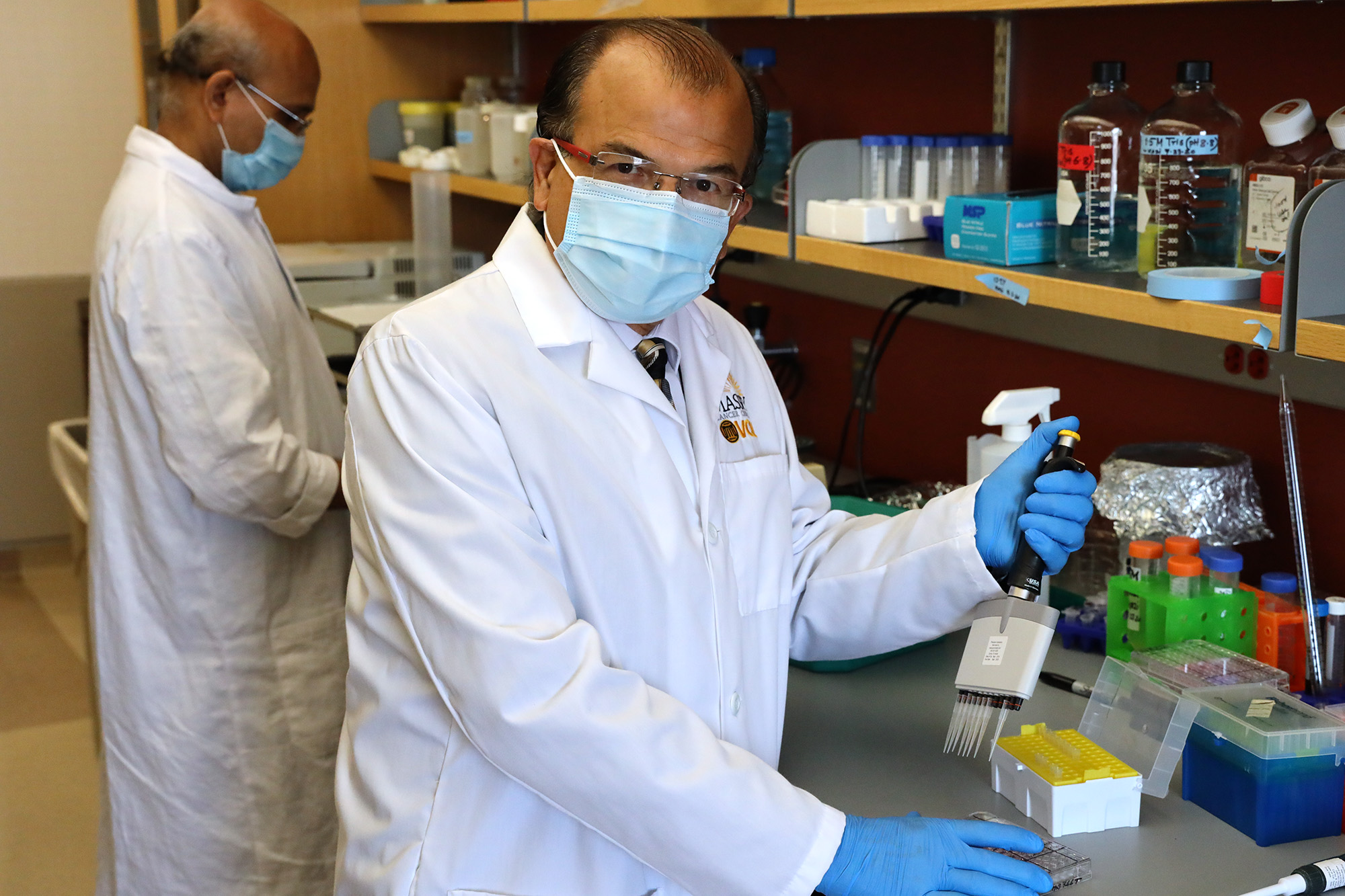Latest News
Research & Innovation
Experimental drug being developed to thwart pancreatic cancer and other KRAS-driven tumors
Sep 4, 2020

In his previous role at Moffitt Cancer Center, Said Sebti, Ph.D., the associate director for basic research at VCU Massey Cancer Center, and his collaborators discovered a novel drug called FGTI-2734 that overcomes a major hurdle in halting the growth of malignant tumors driven by the cancer-causing KRAS protein, including pancreatic cancer. In collaboration with Massey researchers and the Medicines for All Institute (M4ALL) at VCU, Sebti intends to further develop FGTI-2734 at Massey in an effort to eventually gain FDA approval for testing the drug in clinical trials.
KRAS is mutated in 90% of pancreatic cancers, the fourth leading cause of cancer-related deaths in the U.S. Cancer patients with KRAS mutations have more aggressive tumors, respond poorly to chemotherapy and targeted therapies and tend to have a worse prognosis. Because of this, the National Cancer Institute has identified targeting KRAS as a high priority and implemented many initiatives to develop KRAS-specific therapies.
Farnesyltransferase (FT) is a protein required for the cancer-causing activity of KRAS. Previous clinical approaches have revolved around the development of FT inhibitors (FTIs) as promising anticancer agents, but these therapeutics have been mostly ineffective. When FT is inhibited, KRAS can be alternatively activated by another protein called geranylgeranyltransferase-1 (GGT-1), which leads to tumor resistance to the FTI drugs.
“At present, there are no FDA-approved drugs to directly target mutant KRAS-driven human cancers, and novel drugs are urgently needed for the large number of afflicted patients,” said Sebti, Lacy Family Chair in Cancer Research and member of the Developmental Therapeutics research program at Massey. “We developed a small molecule that overcomes the major hurdle of mutant KRAS-dependent resistance to FTIs, thwarting growth in primary and metastatic tumor samples derived from pancreatic cancer patients who progressed on therapy.”
Through previous research, published in Clinical Cancer Research and supported by the NCI Outstanding Investigator Award R35 grant, Sebti and collaborators discovered that FGTI-2734 can inhibit KRAS membrane localization, which is required for its cancer-causing activity. FTGI-2734 proved effective when applied to human pancreatic, lung and colon tumors.
The study further demonstrated that FGTI-2734 inhibited the growth of mutant KRAS-addicted tumors in mice. The drug also prevented growth in tissue samples from four pancreatic cancer patients with mutant KRAS tumors. It suppressed the viability of primary and metastatic mutant KRAS tumor cells from eight pancreatic cancer patients, some of whom were resistant to chemotherapy.
Finally, the research also showed that FGTI-2734 blocked cancer-causing pathways, such as AKT, mTOR and cMYC, while increasing the levels of the p53 protein, which is the body’s own cancer-suppressing protein.
“We demonstrated FGTI-2734’s therapeutic efficacy in clinical samples from 12 pancreatic cancer patients with mutant KRAS tumors,” said Sebti, a professor of pharmacology and toxicology at the VCU School of Medicine. “This discovery opens new avenues to target mutant KRAS-dependent cancers and warrants further advanced preclinical and clinical studies.”
In addition to Sebti, the study was co-authored by Aslamuzzam Kazi, M.S., Ph.D., Shengyan Xiang, Ph.D.,Hua Yang, Liwei Chen, Perry Kennedy, M.D., Muhammad Ayaz, Harshani R. Lawrence, Ph.D., Francisca Beato and Jason Fleming, M.D., of Moffitt Cancer Center; Steven Fletcher, Ph.D., of the University of Toronto; Christopher Cummings and Andrew D. Hamilton, Ph.D., of Yale University; Ya’an Kang, M.D., Ph.D., and Michael P. Kim, M.D., of MD Anderson Cancer Center; and Andrea Delitto, Ph.D., Patrick W. Underwood and Jose G. Trevino, M.D., of the University of Florida.
M4ALL is an internationally distinctive facility within the VCU College of Engineering that is equipped to manufacture large volumes of targeted therapeutics that can aid university scientists in conducting their research, including clinical trials.
Written by: Massey Communications Office
Related News
Research & Innovation, Clinical Care, Community Engagement
Clinical trials: Shaping the standard of cancer care for the countryFeb 9, 2026
Research & Innovation
How a heart medication could unlock a new targeted approach in lymphomaFeb 4, 2026
Research & Innovation
Massey researcher uses millions in grant funding to accelerate drug discovery for cancerFeb 3, 2026

Get access to new, innovative care
Treatments in clinical trials may be more effective or have fewer side effects than the treatments that are currently available. With more than 200 studies for multiple types of cancers and cancer prevention, Massey supports a wide array of clinical trials.

Find a provider
Massey supports hundreds of top cancer specialists serving the needs of our patients. Massey’s medical team provides a wealth of expertise in cancer diagnosis, treatment, prevention and symptom management.
